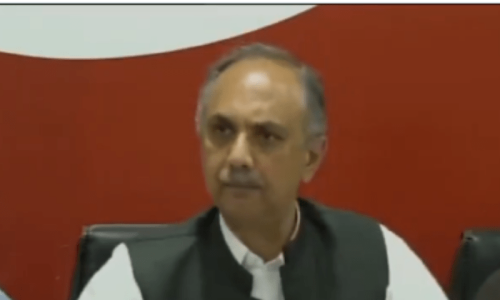PARIS: Heavily armed men shouting religious slogans stormed the headquarters of a satirical weekly here on Wednesday, killing 12 people in cold blood in the worst attack in France in decades.
The assault on the headquarters of Charlie Hebdo in a quiet Paris neighbourhood sparked a massive manhunt as the two gunmen managed to escape, executing a wounded police officer as they fled.
The men remained on the run till late into the night, with few clues on their whereabouts and parts of the French capital in lockdown.
Victims included four prominent cartoonists, among them the editor-in-chief, Stephane Charbonnier, who had lived under police protection for years after receiving death threats.
The chief editor was holding a morning meeting when the assailants armed with Kalashnikovs burst in and opened fire . The three other cartoonists who died were Jean Cabut, Georges Wolinski and Bernard Verlhac.
President Francois Hollande immediately rushed to the scene of “an act of exceptional barbarism” and “undoubtedly a terrorist attack”. Hollande called for “national unity”, adding that “several terrorist attacks have been foiled in recent weeks”.
US President Barack Obama condemned the attack, while British Prime Minister David Cameron called it “sickening”. German Chancellor Angela Merkel said the attack was “despicable” and Russian President Vladimir Putin as well as the Arab League condemned the violence.
The satirical newspaper gained notoriety in Feb 2006 when it reprinted sacrilegious cartoons that had originally appeared in Danish daily Jyllands-Posten. The cartoons set off a wave of violence in the Middle East which claimed 50 lives.
Its offices were fire-bombed in Nov 2011 when it published an objectionable sketch.
Despite being taken to court under anti-racism laws, the weekly continued to publish controversial cartoons.
In Sept 2012, Charlie Hebdo published more cartoons that Muslims found objectionable.
WRONG ADDRESS: The attack began with the gunmen first going to the wrong address at 6 rue Nicolas Appert, where the paper’s archives are located. After realising their mistake they moved a few doors down to the weekly’s headquarters.
Prosecutors said witnesses heard the gunmen shout “we have avenged the prophet” and “Allahu Akbar” as they carried out the attack.
Police said the calm, calculated manner of the assault showed they were highly trained.
Amateur video shot after the bloodbath showed two men masked and dressed head to toe in black military style running toward a wounded policeman as he lay on the pavement.
The attacker says “you wanted to kill me?” before shooting the officer in the head. The gunmen then climb into their getaway vehicle and drive off.
Large numbers of police and ambulances rushed to the scene, where shocked residents spilled into the streets. Reporters saw bullet-riddled windows and people being carried out on stretchers.
Two police personnel were confirmed among the dead and four people were critically injured.
One man who witnessed the attack described a scene like “in a movie”.
“I saw them leaving and shooting. They were wearing masks.
“At first I thought it was special forces chasing drug traffickers or something.”
The publication’s website went down after the attack before coming back online with the single image of the words “I am Charlie” which has been trending worldwide on social media.
Thousands of people gathered on the large Republique square in Paris holding up banners of the phrase.
The killings took place on the day the latest edition of Charlie Hebdo was published, featuring controversial French author Michel Houellebecq, whose latest book imagines a France in the near future that is ruled by an Islamic government.
The attack comes at a time of heightened fears in France and other European capitals over fallout from the wars in Iraq and Syria, where hundreds of European citizens have gone to fight alongside the radical Islamic State group.
In a sign of such tensions, a media group’s office in Madrid was evacuated later in the day after a suspicious package was sent there.
Published in Dawn January 8th , 2014
On a mobile phone? Get the Dawn Mobile App: Apple Store | Google Play

















































Dear visitor, the comments section is undergoing an overhaul and will return soon.